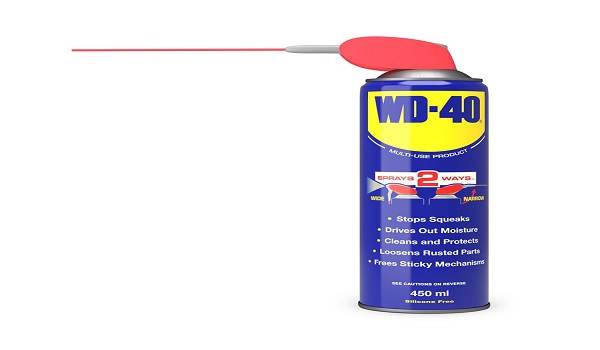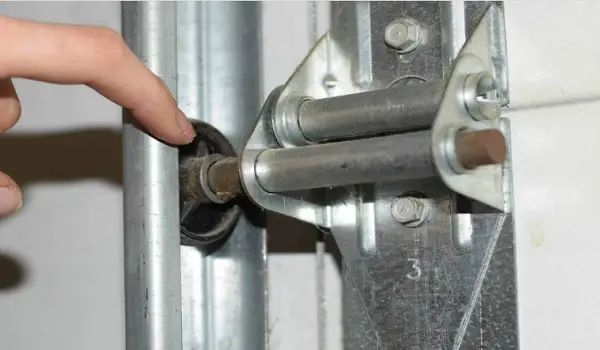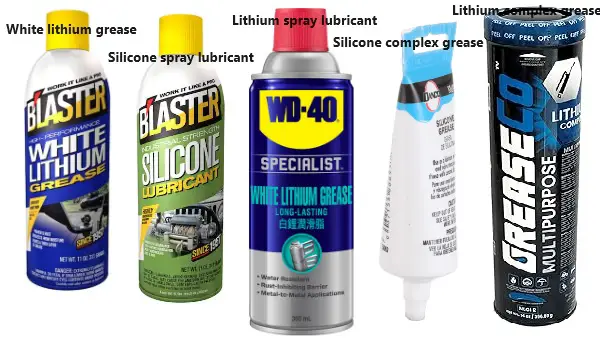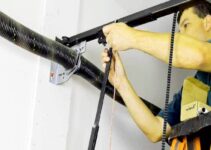When it comes to garage door maintenance, many homeowners are often faced with the dilemma of choosing the right lubricant for their garage door rollers.
One common product that might come to mind is WD-40, a versatile penetrating oil with numerous household uses. However, the question remains: Can you use WD-40 on garage door rollers?
In this comprehensive guide, we’ll explore the pros and cons of using WD-40 for this purpose, as well as alternative lubrication methods that are better suited to keep your garage door operating smoothly.
What is WD-40?

WD-40, short for “Water Displacement, 40th formula,” is a popular multi-purpose lubricant known for its ability to penetrate and loosen rust, debris, and other stubborn substances.
It’s a household staple, but its suitability for garage door rollers warrants a closer look.
What are Garage Door Rollers?

Garage door rollers are crucial components of your overhead garage door system. They are responsible for smoothly guiding the door along the tracks as it opens and closes.
Proper lubrication of these rollers is essential to ensure that your garage door functions correctly and quietly.
Why is it Important to Lubricate Garage Door Rollers?
Lubrication plays a pivotal role in the longevity and performance of your garage door system. Without proper lubrication, garage door rollers can become noisy, squeaky, and even damaged due to increased friction and wear.
Regular maintenance not only extends the life of your garage door but also reduces the risk of costly repairs down the road.
Can You Use WD-40 on Garage Door Rollers?

WD-40 is Not the Best Lubricant for Garage Door Rollers
While WD-40 is a versatile product with numerous applications, it’s not the ideal choice for lubricating garage door rollers. Here’s why:
- Not a Long-lasting Lubricant: WD-40 is a penetrating oil, designed to loosen and displace moisture. It lacks the long-lasting lubrication properties required for garage door rollers. It may provide temporary relief from squeaking, but it won’t offer enduring protection.
- Attracts Dirt and Dust: WD-40 has a knack for attracting dirt and dust, which can accumulate on your garage door rollers, making them even dirtier and less efficient over time.
- Potential Damage: Using WD-40 on your garage door rollers can lead to damage, particularly to the powder coat finish on the rollers. This can compromise the appearance and functionality of your garage door.
Better Lubricants for Garage Door Rollers

To ensure that your garage door operates smoothly and quietly, it’s advisable to use lubricants specifically designed for this purpose.
The best lubricants for garage door rollers are lithium- or silicone-based greases. These lubricants offer several advantages:
- Long-lasting: Lithium and silicone-based greases provide lasting lubrication, reducing the need for frequent reapplication.
- Water-resistant: They are resistant to water, which is crucial for garage doors exposed to the elements.
- Dust-resistant: These greases do not attract dust and dirt, keeping your garage door rollers clean and efficient.
- Rust and Corrosion Protection: They offer excellent protection against rust and corrosion, further extending the life of your garage door components.
Some specific examples of suitable lubricants for garage door rollers include:
- White lithium grease
- Silicone spray lubricant
- Lithium spray lubricant
- Lithium complex grease
- Silicone complex grease
How to Lubricate Garage Door Rollers
Properly lubricating your garage door rollers is a straightforward process that can be done with minimal tools. Here are the steps:
- Disconnect the Garage Door Opener: Ensure the garage door opener is disconnected from the power source to prevent any accidents.
- Raise the Garage Door Manually: Lift the garage door manually until it is fully open. This step provides easy access to the rollers.
- Apply Lubricant to Roller Bearings: Apply a small amount of lithium- or silicone-based grease to the bearings of each roller. Ensure even coverage to maximize lubrication.
- Lower the Garage Door Manually: Carefully lower the garage door manually to allow the lubricant to spread evenly on the roller bearings.
- Reconnect the Garage Door Opener: Finally, reconnect the garage door opener to restore automated functionality.
Maintenance and Troubleshooting
To keep your garage door rollers in top shape, regular maintenance is essential. It is recommended to lubricate your garage door rollers every 6-12 months. However, in dusty or humid climates, more frequent lubrication may be necessary.
Troubleshooting Garage Door Roller Problems
Common issues with garage door rollers include squeaking, noise, sticking, and roller malfunction. Here’s how to address these problems:
- Squeaky or Noisy Rollers: If your garage door rollers are noisy, lubrication is often the solution. Apply the appropriate lubricant to quieten the noise.
- Stuck or Not Working Rollers: If your garage door rollers are stuck or not working correctly, inspect for debris, rust, or damage. Clean or replace rollers as needed.
Conclusion
In conclusion, while WD-40 is a versatile product with numerous household uses, it’s not the best choice for lubricating garage door rollers.
Instead, opt for lithium- or silicone-based greases that offer long-lasting lubrication, protect against dust and moisture, and prevent damage to your garage door components.
By following proper maintenance procedures and using the right lubricants, you can ensure that your garage door operates smoothly and efficiently, keeping your home secure and convenient.
So, to answer the question, “Can you use WD-40 on garage door rollers?” – it’s not the recommended choice for optimal garage door maintenance and longevity.


